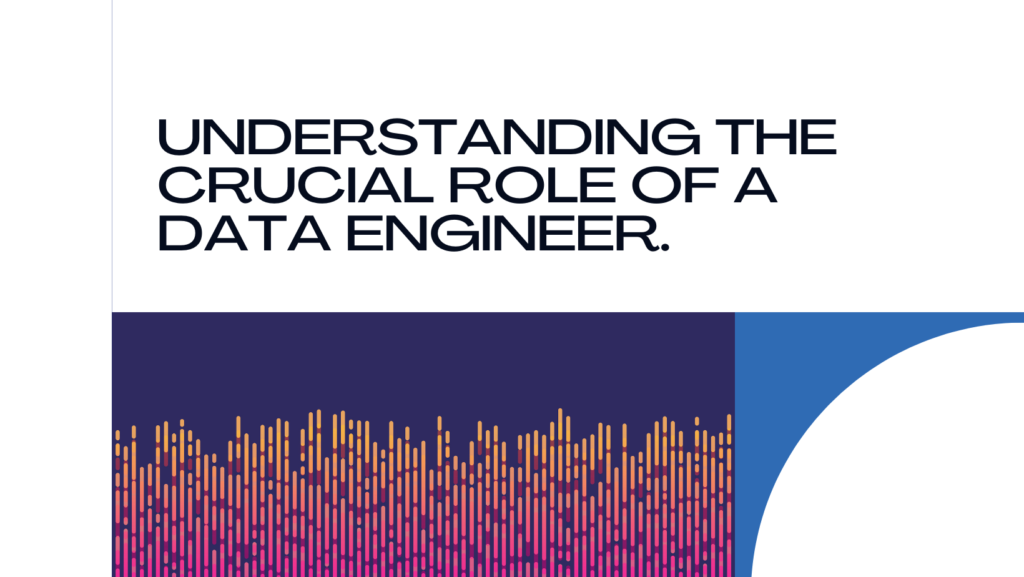Demystifying the Role of a Data Engineer: Everything You Need to Know

Introduction: In today’s data-driven world, the role of a data engineer has become increasingly critical. From designing data pipelines to ensuring data quality, data engineers play a vital role in harnessing the power of data for organizations. In this comprehensive guide, we will explore what data engineers do, their job description, roles and responsibilities, the skills required, their impact on organizations, how to become one, career paths, and salaries, and we’ll even compare data engineers to data scientists and data analysts in tabular form.
What Does a Data Engineer Do?
Data engineers are the architects of data systems, responsible for creating and maintaining the infrastructure that enables organizations to collect, store, and analyze data. Their primary tasks include:
- Data Pipeline Development: Building and maintaining pipelines for data extraction, transformation, and loading (ETL).
- Data Warehouse Management: Managing data warehouses and databases to ensure data is readily accessible and structured for analysis.
- Data Quality Assurance: Ensuring data accuracy, consistency, and security.
- Integration: Integrating various data sources and tools for a seamless data ecosystem.
Data Engineer Job Description
A typical data engineer job description includes:
- Designing and developing data architecture
- Optimizing data workflows for efficiency
- Collaborating with data scientists and analysts
- Monitoring and maintaining data systems
- Implementing data security measures
Data Engineer Roles and Responsibilities
Data engineer roles and responsibilities encompass:
- ETL Development: Designing and implementing ETL processes.
- Data Modeling: Creating data models for efficient storage and retrieval.
- Database Management: Administering and optimizing databases.
- Data Integration: Integrating data from diverse sources.
- Data Governance: Ensuring data compliance and security.
Skills Required to Become a Data Engineer
Key skills for data engineers include:
- Programming: Proficiency in languages like Python, Java, or Scala.
- Database Management: SQL knowledge and expertise in NoSQL databases.
- Big Data Tools: Familiarity with tools like Hadoop, Spark, and Kafka.
- ETL Tools: Experience with ETL tools such as Apache Nifi or Talend.
- Cloud Platforms: Knowledge of cloud services like AWS, GCP, or Azure.
How Data Engineers Bring Value to Organizations?
Data engineers contribute value to organizations by:
- Improving Data Access: Making data readily available for analysis.
- Data Quality Assurance: Ensuring data accuracy and reliability.
- Efficiency: Optimizing data workflows for faster insights.
- Supporting Data-Driven Decisions: Empowering data scientists and analysts.
How to Become a Data Engineer?
To become a data engineer, follow these steps:
- Obtain a relevant bachelor’s degree (e.g., computer science or data engineering).
- Learn programming languages and database management.
- Gain experience with ETL tools and big data technologies.
- Build a portfolio of projects showcasing your skills.
Data Engineer Career Path
The career path for data engineers often leads to roles like:
- Senior Data Engineer
- Data Architect
- Data Engineering Manager
- Chief Data Officer
Data Engineer Salary
Data engineer salaries vary based on location, experience, and skills. On average, they can earn between $80,000 to $150,000 per year.
Data Scientist vs Data Engineer
| Aspect | Data Scientist | Data Engineer |
| Main Role | Analyze data for insights | Design and build data systems |
| Key Skills | Data analysis, ML, statistics | ETL, database management |
| Tools and Languages | Python, R, TensorFlow | SQL, Python, Big Data tools |
| Focus | Data analytics and modeling | Data infrastructure |
Data Engineer vs Data Analyst
| Aspect | Data Engineer | Data Analyst |
| Main Role | Build data infrastructure | Analyze data for insights |
| Key Skills | ETL, database management | Data analysis, visualization |
| Tools and Languages | SQL, Python, Big Data tools | Excel, BI tools, SQL |
| Focus | Data pipeline construction | Data interpretation |
Conclusion: Data engineers are the backbone of a data-driven organization, responsible for creating, maintaining, and optimizing data infrastructure. Their unique skill set is crucial for ensuring that data scientists and data analysts have access to clean and reliable data, empowering organizations to make data-driven decisions. Whether you’re considering a career as a data engineer or seeking to understand their importance in the data ecosystem, this guide has provided you with valuable insights into the world of data engineering.

Leave a Reply